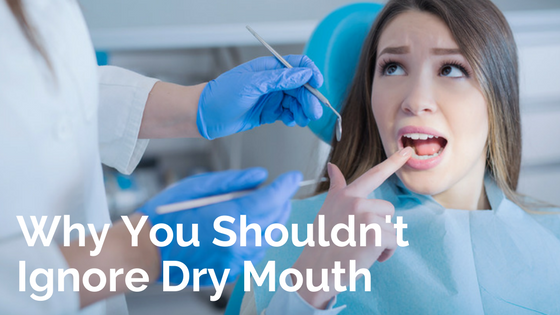
If you’re experiencing hoarseness, frequent thirst, bad breath, mouth sores, or problems swallowing, you may be suffering from xerostomia, or dry mouth. Far from being a mere inconvenience, dry mouth can increase your risk for an array of oral conditions you don’t want, including gum disease, tooth decay and oral yeast infections, such as thrush. If these conditions become advanced, you will need specialized treatment.
What causes dry mouth?
There are several causes, among them certain illnesses, smoking, radiation therapy, nerve damage, simple aging and some prescription and over-the-counter medications.
The list of drugs that can cause dry mouth is long and includes medications to treat depression, anxiety, pain, allergies and colds, hypertension, diarrhea, nausea, asthma, urinary incontinence, and Parkinson’s disease. Whatever the cause, the result is too little saliva for your comfort and good oral health.
Why do we need saliva?
You probably know saliva is fluid secreted from glands in your mouth. You make between one and two quarts of saliva a day, of which 99.5% is water. The remaining half-percent seems minute but is vital. In it is a host of substances such as electrolytes, enzymes, mucus, and antimicrobial agents that keep your mouth and digestion healthy.
Here, adapted from the Mayo Clinic website, are some of the ways saliva benefits your oral health:
- It neutralizes the acids produced by plaque bacteria, limiting growth of the bacteria that cause tooth decay and bad breath.
- It maintains the correct pH balance, protecting tooth enamel, and even rebuilding it.
- It helps wash away bits of food that stick to your teeth.
- It makes food easier to chew and swallow, and its enzymes aid digestion.
- It enhances taste perception.
How is dry mouth treated?
If you’re suffering from dry mouth, it’s important to re-stimulate the flow of saliva. The treatment depends on the cause. If you have an underlying illness that is the culprit, your doctor may be able to change your medications. Your dentist, besides ensuring your teeth and gums remain healthy, can prescribe oral rinses to help restore your mouth moisture.
There are steps you can try for yourself, too:
- Stay hydrated – drinking plenty of water will keep your mouth moist.
- Protect your teeth with fluoride gel that can be applied with custom trays or a brush, after all of the plaque has been removed from your teeth.
- Suck on sugar-free hard candies or chew sugar-free gum to increase saliva flow; products containing xylitol are recommended.
- Avoid spicy or salty foods, and limit caffeine and alcohol, both of which can dehydrate you.
- Don’t smoke.
- Breathe through your nose, not your mouth, as much as possible.
- Sleep with a room vaporizer to add moisture to the air.
- Use an over-the-counter artificial saliva substitute.
- Most important: Be diligent about your oral hygiene. Floss and dry brush every day for 8-10 minutes at one time in order to meticulously remove all of the plaque from your teeth.
The bottom line: Dry mouth is not just a bothersome condition – a prolonged deficiency of saliva can eventually lead to serious dental consequences if not effectively managed. But the good news is, it’s treatable if you take care of it early.



